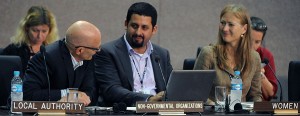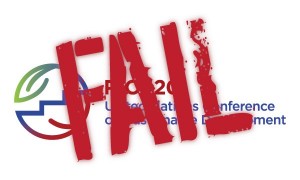Rio Plus 20 concludes as a two-fold fraud, so we walked out
On Thursday, more than a hundred of young people and NGO activists decided that it was time for their voice to be heard and to send a strong signal about the Rio Plus 20 process. Together, we decided to reclaim some space at this conference and hold a “people assembly” in the conference centre, based on the occupy model. The group then collectively decided to express its anger at our leaders by simply turning our back to the conference and leaving peacefully the venue, handling collectively our badges to the security staff as we walked passed the security gate.
 Personally, the decision to walk out of the venue went behind symbolism. Having spent most of my time over the past few years working around these large UN conferences, both as a researcher and as a youth activist, leaving a UN process out of disdain comes with a rather strong questioning of about everything I have worked for over the past four years. Right now, I still believe that civil society should engage in these intergovernmental processes and that those do have an added-value, perhaps not the one we would like to expect, but at least in bringing people together and opening a space for discussions.
Personally, the decision to walk out of the venue went behind symbolism. Having spent most of my time over the past few years working around these large UN conferences, both as a researcher and as a youth activist, leaving a UN process out of disdain comes with a rather strong questioning of about everything I have worked for over the past four years. Right now, I still believe that civil society should engage in these intergovernmental processes and that those do have an added-value, perhaps not the one we would like to expect, but at least in bringing people together and opening a space for discussions.
I also agree to some extend with those criticizing simple messaging around the failure of governments to act. One cannot come at the beginning of such a conference with high hopes and be surprised that governments face difficulties to reach an agreement that would have had major implications for all countries. I also find the rhetoric around “us” and “them” counterproductive most of the time. In the coming days, I will share more thoughts about the changing role and responsibility of the nation-states its some implications.
But Rio Plus 20 infuriates me more than any previous experience. And this for several reasons.
 First, the content of the document that is adopted by the conference as I am writing this post will set in historical records a double counter-truth. This document will be come down officially under the pompous title “the future we want” despite the fact that no one seems really happy with it. During the last round of comments concluding the negotiations, someone commented on the fact that no government was fully satisfied with its content. Besides, presenting this document as the future we want is an offense to future generations since governments have agreed to maintain the status quo on so many issues that will severely affect future generations. Bill McKibben pointed to the fact that throughout the whole 50-pages long document, countries referred only five times to what they “will” do. We hear repeatedly that this lack of concrete commitment is the fruit of the political context. So be it, but then let’s be honest about it rather than to make dishonest claims.
First, the content of the document that is adopted by the conference as I am writing this post will set in historical records a double counter-truth. This document will be come down officially under the pompous title “the future we want” despite the fact that no one seems really happy with it. During the last round of comments concluding the negotiations, someone commented on the fact that no government was fully satisfied with its content. Besides, presenting this document as the future we want is an offense to future generations since governments have agreed to maintain the status quo on so many issues that will severely affect future generations. Bill McKibben pointed to the fact that throughout the whole 50-pages long document, countries referred only five times to what they “will” do. We hear repeatedly that this lack of concrete commitment is the fruit of the political context. So be it, but then let’s be honest about it rather than to make dishonest claims.
Another bogus affirmation can to be found in the very first sentence claiming that the document was prepared with the full participation of civil society. True, civil society was given an opportunity to bring proposals to the table. But those have been largely ignored by states. One could only speak about full participation when all the actors are committed to listen to each other. Not to mention that the “Rio Dialogues”, presented as the climax of the engagement of civil society in the lead to the conference, were hold while the final draft of the Rio+20 document was already adopted. On Wednesday, CAN International’s Wael Hmaidan addressed the plenary on behalf of Non Governmental Organizations rejecting this claim and asking for the reference to this “full consultation” to be removed from the text. Symbolically enough, this demand was also ignored…
 Secondly, the whole world is being told a fairy tale… Our political leaders have come together in Rio to engage in discussions about the state of the planet and to work out the final version of the Rio Plus 20 document, we are told. That is, for those countries in which the political elite cared enough to show up at the conference (where were Obama, Cameron, Merkel and others?). But the situation in Rio was quite different. Due to the insistence of Brazil and its (perhaps legitimate) willingness to avoid politicizing the document beyond control, the “Future We Want” was completed before these leaders even arrived in Rio. This could then have offered an opportunity for them to then engage in in-depth dialogues with each other about solutions and ways forward, but instead the large majority of them came only for a family picture and a complaisant speech in front of an almost empty plenary without further engaging with their colleagues on sustainable development issues. French president Hollande came only for a few hours on Wednesday while Clinton did not arrive before Friday. Beyond the failure to adopt decisive actions, Rio+20 should thus also be remembered as a missed opportunity to even launch a dialogue at the highest political level.
Secondly, the whole world is being told a fairy tale… Our political leaders have come together in Rio to engage in discussions about the state of the planet and to work out the final version of the Rio Plus 20 document, we are told. That is, for those countries in which the political elite cared enough to show up at the conference (where were Obama, Cameron, Merkel and others?). But the situation in Rio was quite different. Due to the insistence of Brazil and its (perhaps legitimate) willingness to avoid politicizing the document beyond control, the “Future We Want” was completed before these leaders even arrived in Rio. This could then have offered an opportunity for them to then engage in in-depth dialogues with each other about solutions and ways forward, but instead the large majority of them came only for a family picture and a complaisant speech in front of an almost empty plenary without further engaging with their colleagues on sustainable development issues. French president Hollande came only for a few hours on Wednesday while Clinton did not arrive before Friday. Beyond the failure to adopt decisive actions, Rio+20 should thus also be remembered as a missed opportunity to even launch a dialogue at the highest political level.
Finally, I feel I can no longer bear the patronizing and irresponsible attitude of decision makers towards young people. How many times have we heard over the past couple of weeks the following message:
No matter how little will be agreed here, or how much governments fail to act in general, I still have hope. You, as youth, are now in control of the society because you have social media. With social media you will save the world.
I wonder how I have managed to resist the urge to scream back “get off our backs, enough of this lame facebook-democracy argument, get your own acts together or surrender the authority you have to others who have the required vision and daring.” I do welcome when leaders challenge youth highlighting the lack of engagement of the younger generation. But anyone claiming that a few tweets and profile updates will save the world is disingenuous.
Discussions with passionate, visionary and committed people, particularly among youth groups, are giving me the means and energy to turn in the coming months this anger into actions and to bounce back. But I would really appreciate if the UN and political leaders could be more sincere. The current misuse of public authority requires us to waste so much of our energy and resources to work on damage control and expose these frauds, rather than to promote the solutions that would create the positive change needed.
Images: Leila Mead/IISD, Nina Best




-
Friend_otter
-
Clancy M
-
http://rioplustwenties.org/?p=1289 Copacabana Blues? Personal reflections after Rio+20
About the author
Sébastien Duyck
Passionate environmental advocate, PhD student (Human Rights and Environmental Governance). Following particularly UNFCCC, UNEP and Rio+20 processes
